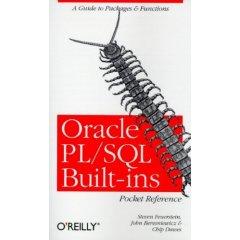| 2020ok Directory of FREE Online Books and FREE eBooks |
Free eBooks > Computers & Internet > Databases > Specific Databases > SQL > General > Oracle PL/SQL Built-ins Pocket Reference
Oracle PL/SQL Built-ins Pocket Referenceby Steven Feuerstein  Download Book If you are the author or the publisher, and would like to link to your site here, please contact us. About Book Book Description This pocket reference provides quick-reference information that will help you use Oracle Corporation's extensive set of built-in functions and packages, including those new to Oracle8. Oracle's PL/SQL language is a programming language providing procedural extensions to the SQL relational database language and to an ever-growing number of Oracle development tools. Among the most useful constructs in the PL/SQL language are the built-in functions and packages. Built-in functions are constructs that operate on certain types of data (e.g., numeric, character) to return a result. By using functions, you can minimize the coding you need to do in your programs. Functions are described in detail in Steven Feuerstein's Oracle PL/SQL Programming; this comprehensive guide to building applications with PL/SQL has become the bible for PL/SQL developers who have raved about its completeness, readability, and practicality. Built-in functions fall into several major categories:
Built-in packages (collections of PL/SQL objects, such as functions, procedures, and data structures) greatly expand the scope of the PL/SQL language. These packages are described in detail in Feuerstein's and Beresniewicz's book, Oracle Built-in Packages. Built-in packages are built by Oracle Corporation and stored directly in the Oracle database. The functionality of the built-ins is available from any programming environment that can call PL/SQL stored procedures, including Visual Basic, Oracle Developer/2000, Oracle Application Server (for Web-based development), and, of course, the Oracle database itself. Built-in packages extend the capabilities and power of PL/SQL in many significant ways. For example:
The book shows how to call all of the commonly used built-in functions and packages. For packages, it also shows the RESTRICT REFERENCES pragmas (needed if you call packages from a SQL statement), as well as the exceptions, constants, and data structures defined in the packages.
Related Free eBooks
| Related Tags |












SEND A COMMENT
PLEASE READ: All comments must be approved before appearing in the thread; time and space constraints prevent all comments from appearing. We will only approve comments that are directly related to the article, use appropriate language and are not attacking the comments of others.